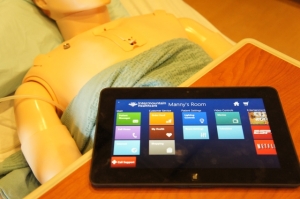
(Courtesy of Intermountain Healthcare)
By Lauren Dubinsky
Intermountain Healthcare has a goal to change health care, and its Healthcare Transformation Lab is what it plans to do it with. The patient room of the future, 3-D printing of medical devices, hand-washing sensors, and life detectors are a few of the projects they already have underway.
"It's for us to trial, bring together, incubate, think about, experiment with leveraging technology and changing health care," says Fred Holston, chief of technology at Intermountain.



Ad Statistics
Times Displayed: 79227
Times Visited: 2801 Ampronix, a Top Master Distributor for Sony Medical, provides Sales, Service & Exchanges for Sony Surgical Displays, Printers, & More. Rely on Us for Expert Support Tailored to Your Needs. Email info@ampronix.com or Call 949-273-8000 for Premier Pricing.
The lab is located in two stand-alone buildings on the campus of Intermountain's largest medical center in Murray, Utah. The hospital partnered with founding members, Xi3 and Intel and collaborators, Dell, CenturyLink, NetApp and Sotera Wireless to create this lab for clinicians and partners to come together and pool their ideas.
Holston says that technology helps them collect more data, analyze it and come up with better solutions to help physicians make the best choices for their patients. "Bringing in technology allows us to offer care at the right place, right time and right amount and it's just going to continue to evolve that way,” says Holston.
Over 30,000 people work for Intermountain and they all go to the lab to discuss their ideas. When they get there, they are put in groups to discuss ideas, look at each one from a variety of perspectives and give guidance on whether or not the hospital should work on them.
The patient room of the future is no longer something of the future. Intermountain has found a way to use advanced interactive technologies to monitor patients' vital signs without being connected to wires. The room will be personalized to each patient to accommodate their light, sound, entertainment and Internet access preferences.
"For us, the patient room of the future is really just rethinking what the room can do and putting the patient at the center of that," says Holston.
Patient-centered care revolves around putting the patient first in every decision. Holston says he believes this type of care is extremely important and it is one of the reasons for everything Intermountain is doing. Instead of giving the patients a plethora of tests they don't need, they strive to keep the patient mentally healthy and come to conclusions on what tests and procedures they should use as quickly as possible.
The hand-washing sensor — an idea from a hospital nurse — is a watch-like device that aims to reinforce proper hand hygiene to prevent infections. The life detector is in real-time and notifies caregivers of changes to patients' vital signs when they are in and out of medical facilities.

